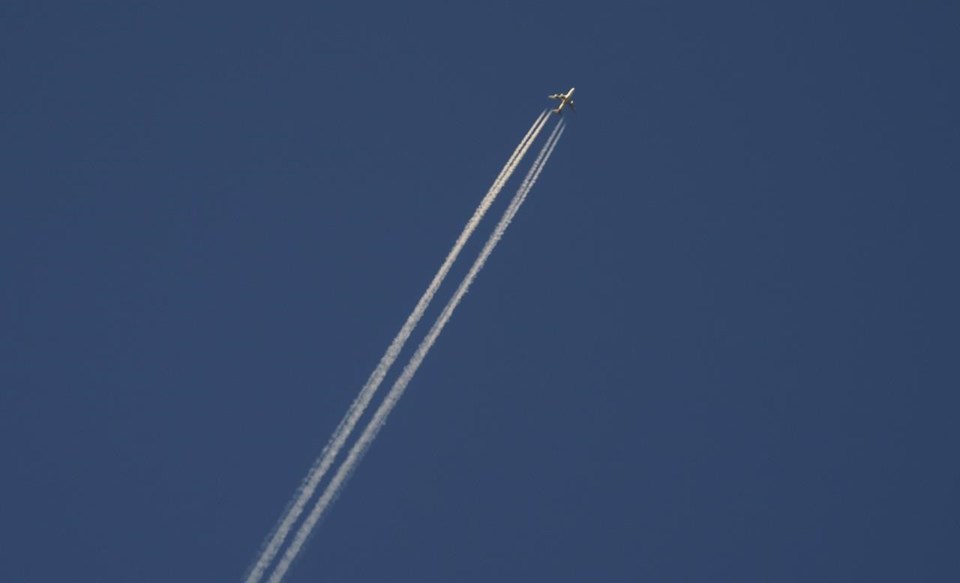MONTREAL — The head of Flair Airlines went on the offensive Monday, saying the weekend seizure of some of its planes may have been instigated by another carrier attempting to disrupt Flair's operations.
Four leased jetliners, on which payments were overdue, were grounded Saturday after a "commercial dispute" with New York-based Airborne Capital Inc., Flair said.
CEO Stephen Jones said the growing presence of Flair and other discount carriers is a threat to the country's two major airlines.
“We’ve come in and upset the cozy duopoly, and as a consequence people want us out of business," Jones said at a news conference on Monday.Â
"And we do believe that there were negotiations going on behind the scenes between one of the majors and the lessor to hurt Flair by them offering probably above-market rates for the aircraft we’ve been leasing."
He did not offer any specifics to back up the claim.
"While I’m not going to name names or cite evidence, I believe that there is much more to this picture than the surface that you see,” Jones said.
WestJet Airlines, Canada's second-largest airline, did not respond to a request for comment.
Peter Fitzpatrick, spokesman for No. 1 carrier Air Canada, said the company had not spoken to any of Flair's lessors, "nor have they come to us offering their aircraft."
The four Boeing 737 Maxes were "only a few days in arrears" with about $1 million owing, "which is about half of one day's sales for us," Jones told reporters. Two additional 737s leased from Airborne Capital were not part of the group of seized planes.
“We’re 100 per cent caught up," he added, referring to payments on leases across its 19-plane operating fleet. (The tally does not include the four seized planes.)
Jones expressed doubt about retrieving the aircraft from Airborne Capital, saying that "it would be a tough road to see them back down — this sort of precipitous hedge-fund behaviour makes negotiations tough."
When asked whether other payments have been overdue in the past six months, Jones did not answer directly: "There's no business, really, that doesn't have some delays."
Airborne Capital has not responded to multiple requests for comment over the past few days.
The abrupt seizures and subsequent accusations hint at the fierce competition playing out across the 91Ô´´ aviation industry as demand for air travel soars.
Leasing prices have skyrocketed since the COVID-19 pandemic as a result, even as domestic airfares have dropped amid a crop of new carriers — Flair, Lynx Air, Canada Jetlines — and expansions at others, said John Gradek, head of McGill University's aviation management program.
As a result, the "slightest sneeze" in a payment plan could trigger termination of an older, cheaper lease, allowing the lessor to find a new client willing to pay more per month for the pricey planes, he said.
"If you screw up your payment with the lessor, they will take the first opportunity to seize the airplane, bring it back and then remarket it at a much higher level of revenue than you would normally get with Flair."
That's especially true for this particular aircraft, which is in high demand and short supply.
Gradek said 737 Max 8s can now cost lessees up to $450,000 per month versus about $150,000 in 2021, with manufacturing bottlenecks further limiting supply. A delayed payment may also tarnish Flair's credit and reputation, making future leases even costlier, he added.
"They're going to be stressed for cash between now and June 15," Gradek said of smaller airlines. "They'll be OK in the summer, but they'll be stressed again in the fall."
The sudden seizure of more than one-fifth of Flair's operating fleet saw the budget carrier scramble to roll out other planes over the weekend, as passengers in Toronto, Edmonton and Waterloo, Ont., dealt with last-minute flight cancellations.
About 1,900 travellers saw their flights cancelled Saturday, with some 420 of them rebooked within three days, Jones said. Others opted for reimbursement.
Some customers posted to social media saying they'd been told their cancellations were due to maintenance issues, an oft-cited reason by airlines that does not trigger passenger compensation protocols.
"Our response on Saturday wasn't perfect. And we accept that," Jones said, but insisted Flair was going "above and beyond" regulatory requirements.
"I know that there were some people that were really badly impacted. I'm very sorry about that."
No flights were cancelled Sunday or Monday as the company brought out three planes that had been waiting in the wings ahead of summer travel season, on top of a fourth freshly leased plane, he said.
If the four seized jetliners cannot be returned, Flair's summer expansion plans may be scuppered.
"We will need to either get other aircraft in, but this is relatively short notice, or we will need to adjust the schedule, I guess is the harsh reality," Jones said.
91Ô´´s still reeling from memories of pandemic confinement have been eager to board flights this year — putting planes in even higher demand from airlines and leasing companies.
The number of scheduled flights by Air Canada and WestJet jumped 31 per cent to 47,362 this month from 36,062 in the same period a year earlier, according to flight data firm Cirium.
Domestic ticket prices have dropped 15 per cent from 2019 amid heightened airline competition — six carriers now ply the Toronto-91Ô´´ route versus two a few years ago — leaving airlines with thinner profit margins as they battle for control of the skies, according to Montreal-based travel data firm Hopper Inc.
This report by The 91Ô´´ Press was first published March 13, 2023.
Christopher Reynolds, The 91Ô´´ Press



